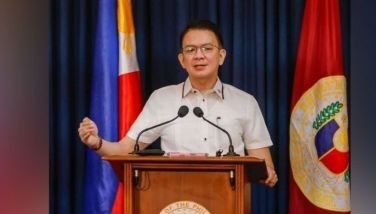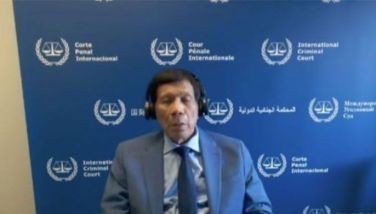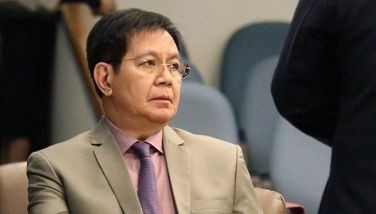Palaro and age cheating
April 24, 2007 | 12:00am
The 2007 Palarong Pambansa kicked off last Sunday at Koronadal City, the second time in 11 years, amidst the refurbished South Cotabato Sports Complex featuring thousands of elementary and high school athletes, sports officials, government functionaries and spectators.
The Palarong Pambansa or Palaro for short is, in the words of former Philippine Sports Commission (PSC) chairman Perry Mequi, the biggest and most successful promoter of competitive school sports in the country. This Philippine version of the national school games brings together budding athletes from all over the country and should therefore be one of the key components of value formation in the educational system.
Sadly, however, Mequi says it is also where one of the most undesirable aspects of sports is spawned – cheating committed by various parties most often through the submission of spurious documents.
The Palaro began in 1908 as the Carnival Games. It was in 1910, however, that the first National Interscholastic Meet was held. In 1974, the Interscholastics (as it was called for short), became officially known as the Palarong Pambansa.
Today, there are more than 8,000 elementary and secondary students competing in the Palaro in 17 sports disciplines: arnis, athletics, badminton, boxing, chess, football, gymnastics, sipa, sepak takraw, softball, swimming, table tennis, taekwondo, volleyball, arnis and dancesports.
Compared to school sports, intramural program and physical education (which has practically been deemphasized in the school curriculum), the Palaro is amply supported with funding support from the government. The Palaro receives an annual funding of P100 million but physical education activities are subsidized through Local School Boards funds that are often regarded as the proverbial drop in the bucket.
The Palaro recently merited public attention, albeit of the wrong kind, when it was reported that the 2006 games held in Naga City was wrought with cheating. It was reported that college-aged students played in elementary school baseball teams.
In his May 21, 2006 column in Metro Post of Dumaguete City, Mequi, an Asian Games bronze medalist and former director of the Bureau of Physical Education and School Sports of the Department of Education wrote, "The widespread cheating that took place during this year’s Palaro reminded me of stories told about how athletic delegations back in the ’50s and up to the ’70s, on board boats that would make documents appear authentic, utilizing the time that would take them to their destination fabricating documents, supporting the eligibilities of their athletes."
In response to the negative publicity and after conducting a thorough probe, it was reported that the "organizers of the Palarong Pambansa, the annual athletic talent search tainted by age-cheating, vowed to clean up house by imposing new guidelines to weed out ineligible players from this year’s games in South Cotabato."
One of these guidelines is an unbelievable number of signatories in documents that are required to establish the eligibility of participating athletes. Among the signatories indicated are those of the school officials which means the homeroom teacher or adviser, principal, supervisor and district superintendent, a medical certificate from the provincial health officer, athletic record approved by the school coach and birth certificate authenticated by the National Statistics Office. The documents should be signed by the parents or guardian of the student-athlete.
It is clear that the intent behind the number of documents and signatories required is to prevent cheating. Feliciano Toledo, head of the DepEd Task Force on School Sports, justified the institution of such measures because of the "controversy that raged during the 2006 Palaro in Naga City, where at least 10 officials were suspended after being found guilty of doctoring their wards’ birth records – and he said a few of the guilty parties are now facing administrative charges."
The Palarong Pambansa or Palaro for short is, in the words of former Philippine Sports Commission (PSC) chairman Perry Mequi, the biggest and most successful promoter of competitive school sports in the country. This Philippine version of the national school games brings together budding athletes from all over the country and should therefore be one of the key components of value formation in the educational system.
Sadly, however, Mequi says it is also where one of the most undesirable aspects of sports is spawned – cheating committed by various parties most often through the submission of spurious documents.
The Palaro began in 1908 as the Carnival Games. It was in 1910, however, that the first National Interscholastic Meet was held. In 1974, the Interscholastics (as it was called for short), became officially known as the Palarong Pambansa.
Today, there are more than 8,000 elementary and secondary students competing in the Palaro in 17 sports disciplines: arnis, athletics, badminton, boxing, chess, football, gymnastics, sipa, sepak takraw, softball, swimming, table tennis, taekwondo, volleyball, arnis and dancesports.
Compared to school sports, intramural program and physical education (which has practically been deemphasized in the school curriculum), the Palaro is amply supported with funding support from the government. The Palaro receives an annual funding of P100 million but physical education activities are subsidized through Local School Boards funds that are often regarded as the proverbial drop in the bucket.
The Palaro recently merited public attention, albeit of the wrong kind, when it was reported that the 2006 games held in Naga City was wrought with cheating. It was reported that college-aged students played in elementary school baseball teams.
In his May 21, 2006 column in Metro Post of Dumaguete City, Mequi, an Asian Games bronze medalist and former director of the Bureau of Physical Education and School Sports of the Department of Education wrote, "The widespread cheating that took place during this year’s Palaro reminded me of stories told about how athletic delegations back in the ’50s and up to the ’70s, on board boats that would make documents appear authentic, utilizing the time that would take them to their destination fabricating documents, supporting the eligibilities of their athletes."
In response to the negative publicity and after conducting a thorough probe, it was reported that the "organizers of the Palarong Pambansa, the annual athletic talent search tainted by age-cheating, vowed to clean up house by imposing new guidelines to weed out ineligible players from this year’s games in South Cotabato."
One of these guidelines is an unbelievable number of signatories in documents that are required to establish the eligibility of participating athletes. Among the signatories indicated are those of the school officials which means the homeroom teacher or adviser, principal, supervisor and district superintendent, a medical certificate from the provincial health officer, athletic record approved by the school coach and birth certificate authenticated by the National Statistics Office. The documents should be signed by the parents or guardian of the student-athlete.
It is clear that the intent behind the number of documents and signatories required is to prevent cheating. Feliciano Toledo, head of the DepEd Task Force on School Sports, justified the institution of such measures because of the "controversy that raged during the 2006 Palaro in Naga City, where at least 10 officials were suspended after being found guilty of doctoring their wards’ birth records – and he said a few of the guilty parties are now facing administrative charges."
BrandSpace Articles
<
>
- Latest
- Trending
Trending
Latest
Trending
Latest
Recommended

































